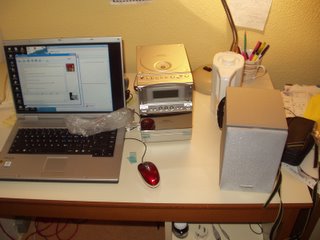The Maison des Elèves
Living in a French Maison des Elèves is often a fascinating experience. It is very different from a British university hall of residence (of which I have more experience than most) for a number of reasons.One of the main differences from British student accommodation is that there is no social space, and no organised collective socialising. It's a shame we don't have a TV room, but my circle of friends and I have more than made up for this by making the rather ghastly kitchen and dining room our own a couple of times a week. It's still pokey and windowless, drably reminiscent of a cross between a prison and a swimming pool changing room, but we've had a lot of fun (and wine) there.
One's first impression is that there is nothing outside the front door to indicate that it belongs to the College, let alone that students live there. This is probably to avoid being the target of rioters. There is just an entry-phone system on the outside. Not having to carry an extra card or key to get in the front is convenient, but most of the students (that is, those who don't live in this Maison, and probably recent alumni too) seem to know the code, so I sometimes wonder how secure it is.
On entering, you are welcomed (or more likely, glared at or ignored) by one of a select, elite crew of receptionists. France is a country that considers égalité as important as liberté, and they certainly recruit according to sound equal opportunities principals here : both genders and all ages are represented, neither rudeness nor lack of people skills is a barrier to employment, our receptionists really are a mixed bag!
The most regular contact with the staff is when one goes down to Accueil (Reception) to ask for a token for the laundry, or to collect one's post. Laundry was a particularly exciting chore in the beginning, before I realised that I saved not only the environment, but 20c by drying my clothes in my room. It also irritated me that one could not purchase both tokens at the same time (perish the thought!), one had to go back, and if there were others in the queue, or if no member of staff was available (or willing), then one had to wait twice to do one load. Probably the most exciting thing that happened was forgetting to tell the lady that I didn't want to dry my clothes, which caused her to have to tipp-ex something out in the big log book of who uses the laundry, and when. (Did I mention that the French are rather fond of bureaucracy?)
All of this was topped off last Saturday, the chosen date for the long-awaited "Coupure Générale de l'Electricité". We had had many weeks to contemplate this eventuality, and to contemplate the possible consequences. The first thing that hit me was that I would not be able to make a cup of tea between 7:30 and 19:30. This surely being dreadful enough, I then realised that I'd only have about 90 minutes of computer time before my battery ran out! But then the network would be down, so what use would it be anyway?! This was slowly turning into some sort of well-advertised and anticipated armageddon which was driving fear into the hearts of innocent students. The very eve of the event, I realised that going to the (windowless) toilet in the dark would be less than pleasant; I had not noticed any emergency lighting anywhere!
Well, I woke up at about mid-day last Saturday (following a party), having not bothered to set my alarm, not because I didn't want to wake up, but because I thought that it wouldn't have any power in any case. The first thing that struck me was that my alarm clock was still glowing
 brightly, and my fridge was whirring loudly in the corner, as per usual. "How can this be?" I asked myself. After spending the entire early afternoon predicting a late start to the advertised black-out, and panicking about the kettle going off just before the water boiled for my first cup of tea of the day, it slowly occurred to me that the workers who were supposed to come in on a Saturday to do the planned works had probably gone on strike and the outage had been canceled (see Fig. 1: Computer, lamp, kettle and hi-fi, all of which require a steady and reliable source of power).
brightly, and my fridge was whirring loudly in the corner, as per usual. "How can this be?" I asked myself. After spending the entire early afternoon predicting a late start to the advertised black-out, and panicking about the kettle going off just before the water boiled for my first cup of tea of the day, it slowly occurred to me that the workers who were supposed to come in on a Saturday to do the planned works had probably gone on strike and the outage had been canceled (see Fig. 1: Computer, lamp, kettle and hi-fi, all of which require a steady and reliable source of power).It is fair to say that the long winter nights are flying by in Paris.

